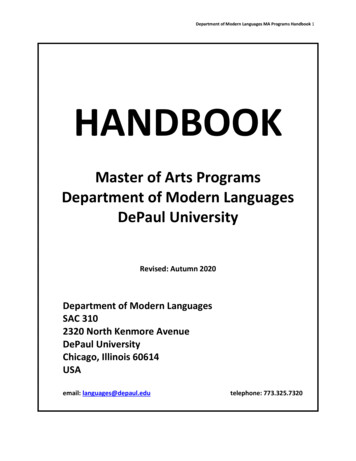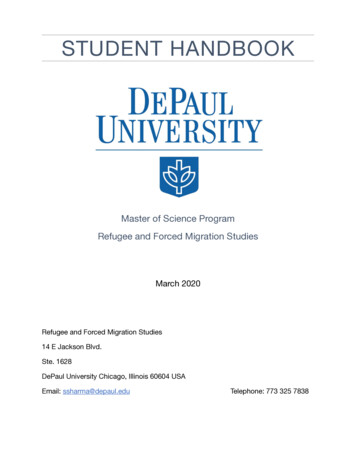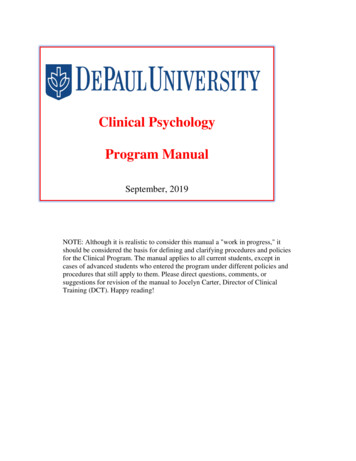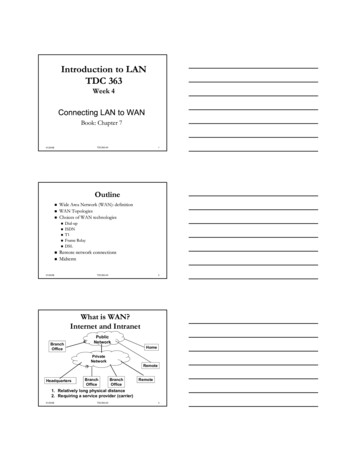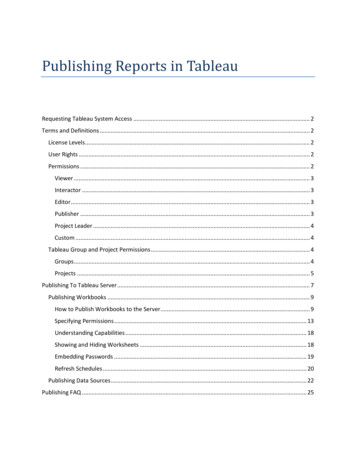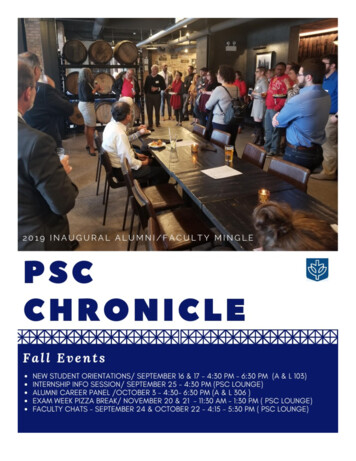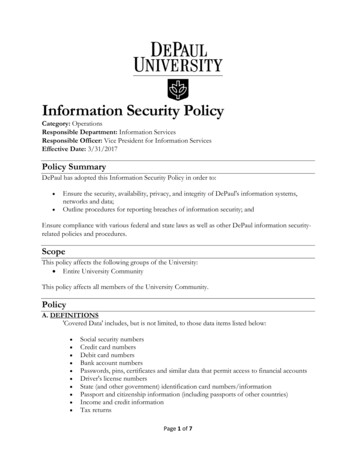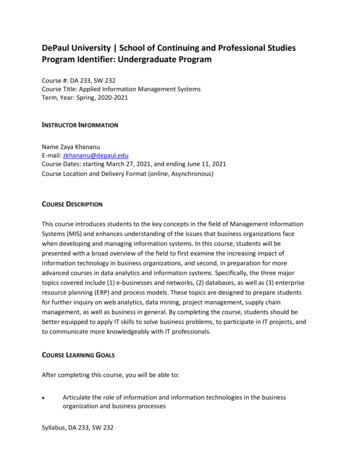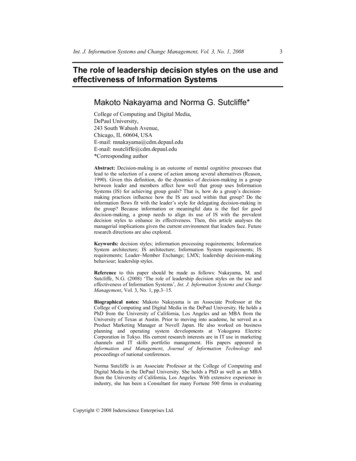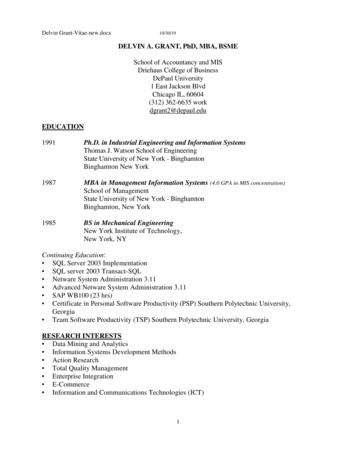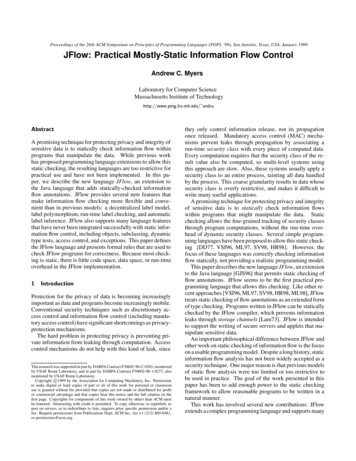
Transcription
DePaul University College of EducationEd.D. ProgramHandbookDoctor of Education Program2013-2014Rev. Sept 2013
Message From the Dean vHistorical Perspective 1General Information 2University Resources for Current Students 3College of Education/Professional Education Unit Conceptual Framework 4Overview 5The Urban Professional Multicultural Educator 5Dispositions for All Candidates 5DePaul University and College of Education Policies and Procedures 8Registration 8Student in Good Standing 8Tuition, Payment Policy and Billing 8Enrollment Changes 8Adding a Closed Course 6Withdrawal from a Course with Full Tuition Reimbursement 7Withdrawal from a Course with No Tuition Reimbursement 7Requesting a Retroactive Withdrawal from a Course 7Withdrawing from the College of Education 7Reclassification/Changing College of Education Graduate Programs 7Readmission 8Grades 10Grade Changes 10Incomplete Grades 10Grade Challenges 10Auditing Courses 10Transfer Credit 10Course Substitutions 11Grade Point Average 11Academic Probation/ Dismissal 11Graduation 11Transcripts 11Grievance Procedure for the College of Education 11Appeals Related to Academic Requirements 12Appeals Related to Academic Process 12Academic Integrity Policy 12College of Education Academic Integrity Policy Extension for Off-Campus Settings 12Licensure 12State Tests 13Principal Licensure 13Doctoral Program in Education (Ed.D. Program) 14Introduction 14The Nature of the Ed.D. Degree 14DePaul University College of Education, Ed.D. ProgramLast revised on October 24, 2013.ii
Distinctive Features of the Program 15Program Background 15Program Organizing Principles 17Program Structure 18Core Courses 16Research Core Courses 20Areas of Concentration 21Early Childhood Education Concentration Courses 21Educational Leadership Concentration Courses 21Curriculum Studies Concentration Courses 23Elective Courses 24Candidacy & Dissertation Research 24Student in Good Standing Course 24Course Sequence 24ISBE Superintendent's Endorsement Eligibility 25Program Standards 25Program Standards for Early Childhood Education 25Meeting Standards in Courses (Early Childhood Education) 26Program Standards for Educational Leadership 25Meeting Standards in Courses (Educational Leadership) 27Program Standards for Curriculum Studies 28Meeting Standards in Courses (Curriculum Studies) 29Advisors for the Ed.D. Program 30Planning Your Course Schedule 30Calendar of Course Offerings 30Suggested Course Sequence 31Doctoral Program Policies 34Active Student Status 34Admissions 34Readmission 34Extension 34Academic Integrity Policy 34Research and the Local/Institutional Review Board (LRB/IRB) 34Dissertation Committee 35Candidacy 35Approval of the Dissertation Proposal 36The Dissertation Process 36Dissertation Format Guide 37The Role of the Ed.D. Program Office 37Responsibility for the Dissertation 37Submitting the Dissertation to the Ed.D. Program Office 38Review of the Dissertation 38DePaul University College of Education, Ed.D. ProgramLast revised on October 24, 2013.iii
Final Submission, Approval, and Letter of Certification 38Technical requirements 38The Text of the Dissertation 39Overview of the Content of the Text 39Organization and Structure 39Tips on Organization and Headings 40Documentation of Sources in Text 41Front Matter 41Back Matter 39Tables and Figures 39Oversized Materials 45Photographs and Copyrighted Figures 46Copyright, Authorship, and UMI 46Other Requirements and Special Cases 47Reference Works 48Appendix A: Dissertation & Graduation Guidelines 49Checklist for the Dissertation Process 49Dissertation Outline 50Sample Title Page 51Sample Signatory Page 52Graduation Checklist 53Appendix B: Ed.D. Program Forms 54Appendix C: Guidelines for Writing an Appeal 55Guide to This HandbookThis Handbook includes general information for all DePaul University students, information particular to theCollege of Education, and information specific to the Doctoral Program in Education.All information in this handbook is subject to change as modifications are made to the curricula andprocedures. Official statements of policy are to be found in the DePaul University Graduate StudentHandbook, the College of Education graduate Course Catalogs (accessible through Campus Connect), andthe College of Education website.Rights Reserved: The provisions of this handbook are not to be regarded as an irrevocable contract. The DePaulUniversity College of Education Program reserves the right to modify, revoke, or add to any and all regulationsat any time.DePaul University College of Education, Ed.D. ProgramLast revised on October 24, 2013.iv
DePaul University College of Education, Ed.D. ProgramLast revised on October 24, 2013.v
Ed.D. Program Handbook 2013-2014HISTORICAL PERSPECTIVEDePaul University was founded as a small liberal arts college, then called St. Vincent’s College, in 1898 by theCongregation of the Mission (Vincentian Fathers). In 1907, the State of Illinois issued a charter to DePaulUniversity, the first Catholic university in Illinois with admission and hiring policies having no religious provisions.Traditionally, the University President has always been a member of the Congregation of the Mission.Today DePaul is a leading comprehensive urban institution of higher learning and the largest Catholic university inthe United States. It has nine Schools and Colleges: the Colleges of Liberal Arts and Sciences, Commerce,Communications, Law, Computing and Digital Media and Education, and the Schools of New Learning, Theater andMusic. DePaul serves over 25,000 students in day and evening programs.DePaul University established the Department of Education within the College of Liberal Arts and Sciences in 1962.It became the School of Education in 1992, and then the College of Education in 2011. It currently serves about2,300 students, preparing educators at both the graduate and undergraduate levels in a variety of programs. TheCollege of Education currently has 25 academic programs and more than 65 full-time faculty. Five of theseprograms lead to initial teacher certification (elementary, secondary, early childhood, physical education, andspecial education). Four of these five areas (early childhood, elementary, secondary, and special education) areoffered at both the graduate and undergraduate level. In addition, the College has six advanced master’s degreeprograms: Bilingual/Bicultural Education, Curriculum Studies, Educational Leadership, Human Services andCounseling, Social and Cultural Foundations in Education, and Language, Literacy, and Specialized Instruction. Adoctoral degree (Ed.D.) is also available with two strands: Educational Leadership and Curriculum Studies.Additionally, the College of Education jointly administers an undergraduate program in music education with theSchool of Music.College of Education Mission StatementThe mission of the College of Education is closely aligned with the urban, Catholic and Vincentian mission ofDePaul University. The College is committed to the preparation of educators who are urban, professional, andmulticultural.GoalsIn order to fulfill its function, the College of Education adopts the following goals (which encompass the traditionalareas of teaching, scholarship, and service): Prepare professionals to work in schools and settings that support the work of schools. Provide practicing professional educators with degree programs, in-service programs, and otheropportunities to develop advanced skills. Provide the University community, professionals in related fields, and the public-at-large with programs andother opportunities to examine educational issues in a larger social and cultural context, and with theperspective of life-long learning. Promote scholarly activity that may lead to the improvement of educational practices (e.g., quantitative andqualitative research, inquiries leading to understanding and insights into current practices or changes ineducation, projects resulting in innovation or improvement in schools, or collaborative endeavors withprofessionals in schools). Sponsor programs of service to children and youth, as well as their families and communities, and tocollaborate with private and public agencies in formulating and delivering these services.DePaul University College of EducationLast revised on October 24, 2013.1
Ed.D. Program Handbook 2013-2014GENERAL INFORMATIONWhile the College of Education offers courses at four campuses, the Doctoral Program currently offers coursesonly at the Lincoln Park Campus. Most but not all courses are held in the College of Education (COE) Building(2247 North Halsted Street), Arts and Letters Building (2315 North Kenmore), Levan Center (2320 NorthKenmore Avenue), and O’Connell Hall (1036 West Belden Avenue).General ception DeskCollege of Education BuildingRoom 140Office Hours9:00 AM - 5:00 PMMonday through FridayCollege of Education Websiteeducation.depaul.eduDegree requirements, graduation application deadlines, contact information for College of Educationfaculty and staff, and much more can be found at the College of Education website.DePaul University Graduate Student /Graduate%20Student%20Handbook/index.htmlThese official documents describe rights and responsibilities, rules and regulations, grievance proceduresand disciplinary sanctions that apply to all students.Campus Connectioncampusconnect.depaul.eduCampus Connection allows you to access all Web-based student services with a single login. ThroughCampus Connection you are able to view the Graduate Course Catalog, course descriptions, class schedulesand financial aid information, register for courses, update your demographic information, and much more.Desire to Learnd2l.depaul.eduDesire to Learn (D2L) is DePaul’s course management system. You can log into D2L with your CampusConnection user name and password. Faculty will post information for classes on D2L, including coursesyllabi, assignments and other information. D2L accounts are also set up for many student organizations,including the Education Doctoral Students Association.Ed.D. Program Contact InformationDirector, Curriculum StudiesConcentrationProf. Joseph GardnerCOE 325773-325-4528jgardne3@depaul.eduDirector, Early Childhood Education Prof. Mojdeh BayatConcentrationCOE 319773-325-1687mbayat@depaul.eduDePaul University College of EducationLast revised on October 24, 2013.2
Ed.D. Program Handbook 2013-2014Director, Educational LeadershipConcentrationAcademic AdvisorProgram AssistantProgram Graduate AssistantGeneral InquiriesProf. Andrea Kayne KaufmanCOE 355773-325-7661akaufman@depaul.eduMaisie YangCOE 150773-325-5233myang17@depaul.educurrently vacantCOE 339773-325-2155Melissa BradfordCOE l.eduUniversity Resources for Current StudentsAll university resources are listed on DePaul’s website under the Current Students section:www.depaul.edu/students. Following is a list of some of the more commonly used resources.Career Centercareercenter.depaul.eduProvides students, alumni and employers with opportunitiesto connect at every point in the career search, whether it’sdeciding on a career path, making a career change, orpreparing for a first job interview.Computer Labsis.depaul.edu/computers/labsProvides information about locations, hours, printingcapabilities, and the available software in universitycomputer labs.Center for Intercultural Programswww.studentaffairs.depaul.edu/cipPromotes artistic expression, intellectual inquiry and studentleadership to support a student-centered multiculturalcommunity at DePaul.Center for Students with Disabilitiesstudentaffairs.depaul.edu/csd/Provides accommodations and support to students withdisabilities that will enable them to fully participate inprograms and services that are available at DePaul University.DePaul Centraldepaulcentral.depaul.eduA one-stop integrated service area where students cancomplete business transactions in four key areas: StudentRecords, Financial Aid, Student Accounts, and Payments.payment plans, and other funding options.ID Servicesis.depaul.edu/systems/cards passesProvides students with DePaul University IDs and CTA UPasses.International Student Servicesinternational.depaul.eduProvides information on study abroad and exchangeprograms and advises international students.Parking Servicesparkingservices.depaul.eduManages parking garages and lots on all of DePaul’scampuses.Public Safetypublicsafety.depaul.eduStrives to maintain a peaceful and safe environment for thestudents, faculty, staff, visitors and neighbors, and to protectuniversity property.Ray Meyer Fitness & Recreation Centercampusrec.depaul.eduEnhances the quality of life of the DePaul community byencouraging active and balanced lifestyles and facilitatesstudent learning through participation in Campus Recreationprograms, services, and facilities.Financial Aidwww.depaul.edu/admission/FinancialAidProvides resources for helping to make college affordable,including informati
DePaul University College of Education, Ed.D. Program ii Last revised on October 24, 2013. . Campus Connection you are able to view the Graduate Course Catalog, course descriptions, class schedules and financial aid information, register for cou
